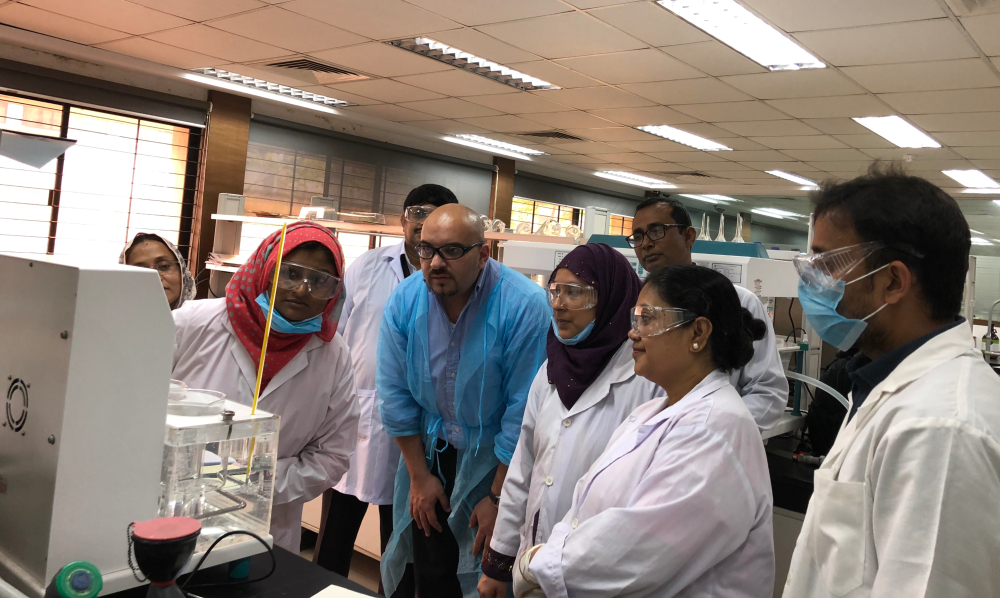
Staff members from Bangladesh’s National Control Laboratory confirm the water temperature of a disintegration testing apparatus with assistance from PQM program Metrology Specialist, Mousa Alasali.
In October 2018, Bangladesh’s Directorate General of Drug Administration (DGDA) announced that its National Control Laboratory (NCL) had become the country’s first national medicines testing laboratory to achieve ISO/IEC 17025:2017 accreditation. This signifies NCL meets the most up-to-date standards for laboratory testing and calibration, as set by the International Organization for Standardization and the International Electrotechnical Commission.
Like other laboratories that were certified under the previous standard, ISO/IEC 17025:2005, NCL had until 2020 to align its operations with the updated version. Beating that deadline by 2 years, Bangladesh continues to demonstrate that investments in ISO/IEC accreditation can provide a significant boost to public health programming in low- and middle-income countries, especially because in-country medicines quality testing is significantly swifter and more economical than outsourcing. “Accreditation of the NCL for medicinal products increases confidence in the DGDA’s capacity to test medicines and to identify any substandard or falsified medicines in the market,” says Mohamed Ramzy Ismail, Technical Officer for Essential Drugs and other Medicines at the World Health Organization (WHO) Country Office, Bangladesh.
Local industry also benefits from home access to internationallyaccepted testing services. “When the world knows that the Bangladesh lab is ISO/IEC 17025:2017 accredited, then our image will be enhanced and export volume will increase day by day,” explains DGDA Director General, Major General Md. Mustafizur Rahman. He notes that long-term government emphasis on meeting worldwide quality standards in the pharmaceutical sector has already enabled Bangladesh to export medicines to more than 150 countries.
ISO/IEC 17025 was last revised in 2005, but the 2017 update is considered to be the first significant change since the standards were established in 1999. According to the International Organization for Standardization, ISO/IEC 17025: 2017 covers technical changes, vocabulary, and developments in IT techniques, and also integrates the latest version of related ISO standards for quality management.
To ensure NCL could meet and maintain the new standards, DGDA turned to the Promoting the Quality of Medicines (PQM) program, which is funded by U.S. Agency for International Development and implemented by USP. PQM’s technical assistance primarily comprised technical training on the testing methods and laboratory management practices included in the ISO 17025:2017 standards. The efforts built on 3 years of collaboration between DGDA and PQM on laboratory strengthening.
NCL Head of Quality Assurance, Dr. Md. Harun-Or-Rashid, underscores that the laboratory’s accreditation success puts it squarely on track for its next goal. “This is not the end, but rather the beginning of another journey to achieve WHO prequalification,” he advises, specifying this would make the laboratory eligible to perform testing for medicines procured by the Global Fund. The Global Fund’s purchase of medicines to fight AIDS, tuberculosis, and malaria reached about US $2 billion globally in 2017.
Dr. Samina Choudhury, a Project Management Specialist in the USAID/Bangladesh Office of Population, Health, Nutrition and Education, concludes by looking at accreditation in the larger context of public health impact: “This achievement increases the availability of quality health products and related technologies, ultimately contributing to the pursuit of universal health coverage,” which Choudhury distinguishes as a key component of USAID/Bangladesh’s Country Development Strategy.
The Promoting the Quality of Medicines (PQM) program is funded by the U.S. Agency for International Development (USAID) and implemented by USP. The PQM program helps low- and middle-income countries strengthen health systems by building capacity in the regulation and manufacture of medical products. This helps increase availability of lifesaving, qualityassured medicines that are critical to accelerating universal health coverage, ensuring healthy lives, and promoting wellbeing for all people of all ages. For more information, visit www.usp-pqm.org.
